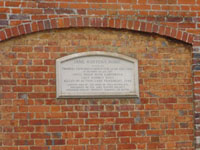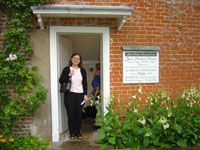|
I.
Irony: Looking back briefly
A. The
thesis from last time: The greatest pleasure in reading Persuasion
lies in allying yourself with the ironist (the narrator) rather than in
identifying with the romantic couple.
B.
Irony is an important stylistic element that allows a writer
to create the sense that narrator and reader are thinking together.
The opening paragraphs
of Persuasion position narrator and reader together
in contemptuous judgment of Sir Walter Elliot (a prominent member of the
"satiric field").
II. Austen's style: gaining access
to interior spaces
A.
Direct discourse
"When
you come to a frigate, of course, you are more confined--though any reasonable
woman may be perfectly happy in one of them; and I can safely say, that the
happiest part of my life has been spent on board a ship. While we were
together, you know, there was nothing to be feared. Thank God! I have always
been blessed with excellent health, and no climatge disagrees with me" (103-4).
B.
Indirect discourse
"There
had been a time, Mrs. Smith told her, when her spirits had nearly failed.
She could not call herself an invalid now, compared with her state on first
reaching Bath" (175).
C. Free indirect discourse
"Mr. Elliot was rational,
discreet, polished, -- but he was not open. There was never any burst
of feeling, any warmth of indignation or delight, at the evil or good of
others. . . . Mr. Elliot was too generally agreeable. Various
as were the tempers in her father's house, he pleased them all. He
endured too welll, --stood too well with everybody" (180-1).
D. Compression of discourse
"Charles, Henrietta, and
Captain Wentworth were the three in consultation, and for a little while
it was only an interchange of perplexity and terror. 'Uppercross,
---the necessity of someone's going to Uppercross, ---the other news to
be conveyed ---how it could be broken to Mr. and Mrs. Musgrove -- the lateness
of the morning, ---an hour already gone since they ought to have been off,
---the impossibility of being in tolerable time.' At first, they were capapble
of nothing more to the purpose than such exclamations" (141).
"When the plan was made known
to Mary, however, there was an end of all peace in it. She was so wretched,
and so vehement, compained so much of injustice in being expectd to go away,
instead of Anne;--Anne, who was nothing to Louisa, while she was her sister,
and had the best right to stay in Henrietta's stead! Why was not she
to be as useful as Anne?" (142).
III.
Thinking and feeling combined
Sentiments and sensations:
"Such were Elizabeth Elliot's sentiments
and sensations; such the cares to alloy, the agitations to vary, the sameness
and the elegance, the prosperity and the nothingness of her scene of life;
such the feelings to give interest to a long, uneventful residence in one
country circle, to fill the vacancies which there were no habits of utility
abroad, no talents or accomplishments for home, to occupy" (51).
"They were actually on the same sofa,
for Mrs. Musgrove had most readily made room for him: they were divided
only by Mrs. Musgrove. It was no insignificant barrier, indeed. Mrs. Musgrove
was of a comfortable, substantial size, infinitely more fitted by nature
to express good cheer and good humour, than tenderness and sentiment; and
while the agitations of Anne's slender form, and pensive face, may be considered
as very completely screened, Captain Wentworth should be allowed some credit
for the self-command with which he attended to her large fat sighings over
the destiny of a son, whom alive nobody had cared for" (101. See also
73, 111-2, 120, 173).
IV. Persuasion and comic
form: thinking through genre
A. The undeserving,
trivial, cold, deceitful, self-preoccupied, worthless characters (those
most prominent in the "satiric field") are in power at the beginning of
the novel.
B. The work of the novel is to set things right.
C. Setting things right does not equal solving the family/estate problem.
D. The reader
& the community
1. Access to interiority without
losing contact with the social world
2. The "satiric field" gives way to "harmony" and "good will" which
is conveyed through Anne's thinking (257)
Winchester Cathedral interior
|


